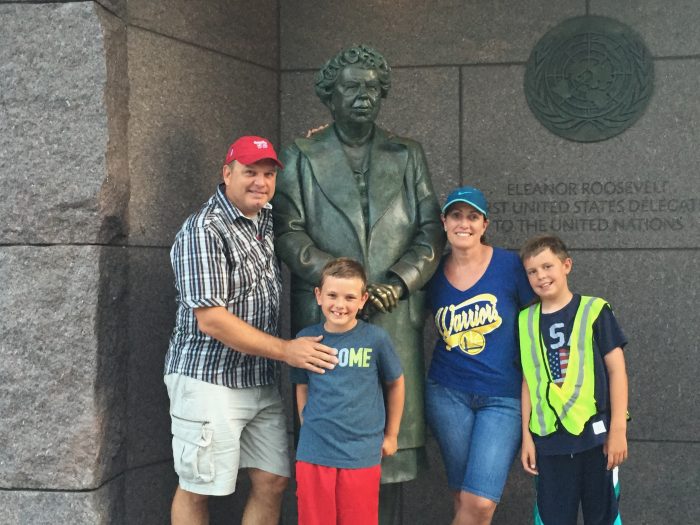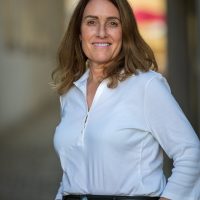I was in the fifth grade when I first heard this saying:
“Great minds discuss ideas, average minds discuss events, and small minds discuss people.”
At 10 years old, this phrase was profound. I had never considered the quality of my conversations, so hearing the quote inspired me to be someone who talked about ideas.
Though the quote’s origin is unverified, it was then-First Lady Eleanor Roosevelt who popularized the provocative phrase. Her birthday is this month (October 11th), and for years I’ve referred to her as one of the top three people I’d love to go back in time and meet.
I feel as though I have known her all my life.
Eleanor was introduced to me at a young age by my father, who was born in 1923. From the time my father was 10 until his early 20s, Franklin D. Roosevelt was our country’s president and Eleanor, our first lady. I remember hearing a lot about the Roosevelts. My parents, who were interested in politics, often spoke of them with high regard. FDR served four terms—the longest-serving president in United States history. Many critical events that shaped our country’s history, like the Great Depression, World War I, and World War II, occurred during his presidency.
As much as my father talked about FDR, he equally mentioned Eleanor. He told me that she held press conferences where only female reporters were allowed to attend. One particular memory I have was a comment he would make repeatedly in a solemn tone that “the world was a better place because of Eleanor Roosevelt.” He was referring to her work with the United Nations. After FDR died in 1945, she played a prominent role in shaping human rights, influenced by the destruction of World War I and visits with Holocaust survivors after World War II.
She was a passionate advocate for basic human rights—for everyone.
In high school, I wrote about Eleanor’s work as Chairman of the Human Rights Commission with the then, newly formed United Nations. She was appointed by President Harry Truman as a member of the first U.S. delegation. The Human Rights Commission was a big deal and hard work, especially with countries such as Russia, Cuba, South Africa, and the United States at the table. All had to agree on the not-so-basic ideas of the protections and rights of others. The Commission successfully created a Universal Declaration of Human rights that would serve as a template for human equality for decades to come.
Eleanor was born into a family with means but had much tragedy in her life. She lost her mother when she was eight, and her father two years later, when she was 10. Her brother died of polio. When she was two and a half years old, her family was on the SS Britannic when it collided with another ship in fog; she was lowered into a lifeboat and taken to the other ship. The incident was so traumatic she would not travel by sea again.
In her teens, she was sent to boarding school in England and credited that experience, and a female headmistress, with growing her confidence. It’s still remarkable that a First Lady of the United States before the 1950s took on an active role in her husband’s political career and then moved on to an even bigger world stage, using her influence, skills, and knowledge to work for the rights of others.
I learned more about Eleanor in college, most notably in women’s studies classes. But she was also discussed in my psychology class in regards to Abraham Maslow’s Hierarchy of Needs. Maslow used the lives of Roosevelt and Albert Einstein to understand what made highly motivated people tick.
In my 50s now, I am even more grateful for the teachings of Eleanor Roosevelt. She has influenced my thinking and, in some cases, my decisions. At a few junctures in my life, I have drawn on her for inspiration and asked, “What would Eleanor do?” She encourages me to make bold decisions, stick up for the less fortunate, and treat others with respect and dignity.
Eleanor Roosevelt was an advocate for the civil rights of African-Americans, laborers, women, children, and those less fortunate. She would certainly be an advocate for LGBTQ rights today, and I believe she’d be on the front lines of the Roe v. Wade overturn, reminding all that women should have the right to make their own decisions about their bodies. She also firmly believed that all lives were valuable; because of this, I think she’d be an advocate for pro-life as well—able to hold the duality and help people understand that pro-life is the protection of all human life, not just the unborn.
As a way to celebrate her birthday this month, I’d like us all to find our inner Eleanor and recognize that the way we treat each other is the cornerstone of our integrity, both as people and as a country.
“Where, after all, do universal human rights begin? In small places, close to home—so close and so small that they cannot be seen on any maps of the world.” ~ Eleanor Roosevelt
~
Please consider Boosting our authors’ articles in their first week to help them win Elephant’s Ecosystem so they can get paid and write more.
~












Read 3 comments and reply